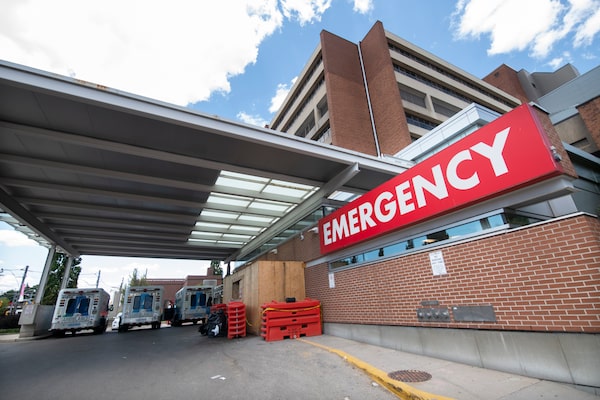
Ambulances parked by the emergency deptartment at Toronto Western Hospital on July 14.Fred Lum/The Globe and Mail
Ottawa’s Montfort Hospital was among the hospitals across Canada forced to close their emergency departments over the weekend, suggesting the most acute effects of the country’s shortage of nurses are starting to spread beyond smaller communities and into large urban centres.
Montfort, which serves French speakers in Ottawa, shut down its emergency department from 7:30 p.m. to 7:30 a.m. on both Saturday and Sunday because of what it called “an unprecedented shortage of nurses” caused by work absences related to COVID-19 infections, fatigue and vacations.
Carleton Place and District Memorial Hospital, located just outside the city, also closed its emergency department for 24 hours over the weekend because of staffing issues, exacerbating the service disruption in the area.
“The decision to close the Emergency, even for a few hours, is not easy to make, but we have to do it, to ensure our team is able to offer excellent, safe and compassionate care when the Emergency reopens,” Montfort said in a statement.
Katharine Smart, president of the Canadian Medical Association, said the temporary closing of Montfort’s emergency room is proof that staffing shortages are continuing to erode quality of care in Canada.
“When you start having major hospitals in major centres that can’t be staffed and be open, that’s really shocking,” she said.
“This problem is growing and we’re not really seeing government addressing it with the urgency it demands.”
For months, health care professionals have been complaining about shortages of medical staff and worsening quality of care at hospitals across Canada, as job-related burnout and grievances about pay have led many workers to leave the industry.
Opinion: Emergency departments are in crisis. Supporting nurses must be our immediate priority
The same mixture of burnout, vacations and pandemic-related absences led to staffing shortages and emergency department closings in other provinces over the weekend. The Sussex Health Centre in New Brunswick, which provides health care services to roughly 30,000 people in the Moncton area, said it would shut from 5:30 p.m. to 7:30 a.m. on Friday, Saturday and Sunday, and would resume normal service Monday morning.
Hospitals in Alberta were also affected. The Fort Saskatchewan Community Hospital said Friday that its obstetrics unit would close for at least two weeks, and asked pregnant mothers to use a hospital 30 minutes away. The South Calgary Health Centre reduced the amount of time it offers urgent care by two hours a day, and a hospital just north of Calgary in Airdrie is shutting down on weekend nights for an eight-week period.
In Ottawa, hospitals that remained open were impacted by the emergency department closings at Montfort and Carleton Place.
The Ottawa Hospital warned on Saturday that emergency department closings in the region would lead to much longer wait times at its own emergency room, as patients were diverted there.
“We know how concerning this can be for patients, and that the waiting can feel long, tiring and difficult,” the hospital said in a statement.
“Please know that our teams will continue working as hard as they can to provide care for everyone in need.”
Last week, Toronto General Hospital issued an alert for three of its intensive care units, which it said were either at full capacity or so short-staffed that they weren’t able to operate at full capacity.
Dr. Smart said staffing issues in some Toronto-area hospitals are particularly troubling because urban hospitals often have specialty wards that require nurses with specific training, and hiring them can be very difficult.
“When we’re losing people with that type of training and experience and they’re no longer working, it’s very worrisome,” she said.
Cathryn Hoy, president of the Ontario Nurses’ Association, said the shortage of nurses is having a cascading affect on hospitals, beyond emergency rooms.
She said she constantly hears troubling stories from nurses around Ontario, including one about a hospital where management has had to step in to help with triaging patients, and another about a hospital where 18 nurses were caring for 55 babies in intensive care.
“It’s just everywhere. If I sat down and made a list I’d have 75 or more issues around the province,” Ms. Hoy said. She added that hospitals in Ontario’s Durham, Niagara and Muskoka regions were among many that were either unable to accept new patients in some departments, intermittently closing their emergency departments or otherwise having to reduce patient care services.
Stephen Warner, press secretary for the Ontario Minister of Health, said in a statement that 90 per cent of the province’s high-urgency patients are finishing their emergency visits within target times, and that surgeries are happening at 88 per cent of their prepandemic rate.
He added that the government is working with the College of Nurses to deploy more internationally educated nurses – who have foreign training but require Canadian credentials before they can practice here – across the province.
“Ontarians continue to have access to the care they need when they need it,” Mr. Warner said.
Dr. Smart said the ministry is picking and choosing statistics that don’t show the entire picture.
“It’s really disregarding what people working in the hospitals are seeing with their own eyes, It feels like gaslighting,” she said, adding that evidence of the problem can be found in an unprecedented number of social-media complaints from physicians and health care workers about working conditions.
“This inability to get on the same page is only making that problem so much worse,” she said. “It’s distressing.”
With a report from The Canadian Press.
Our Morning Update and Evening Update newsletters are written by Globe editors, giving you a concise summary of the day’s most important headlines. Sign up today.